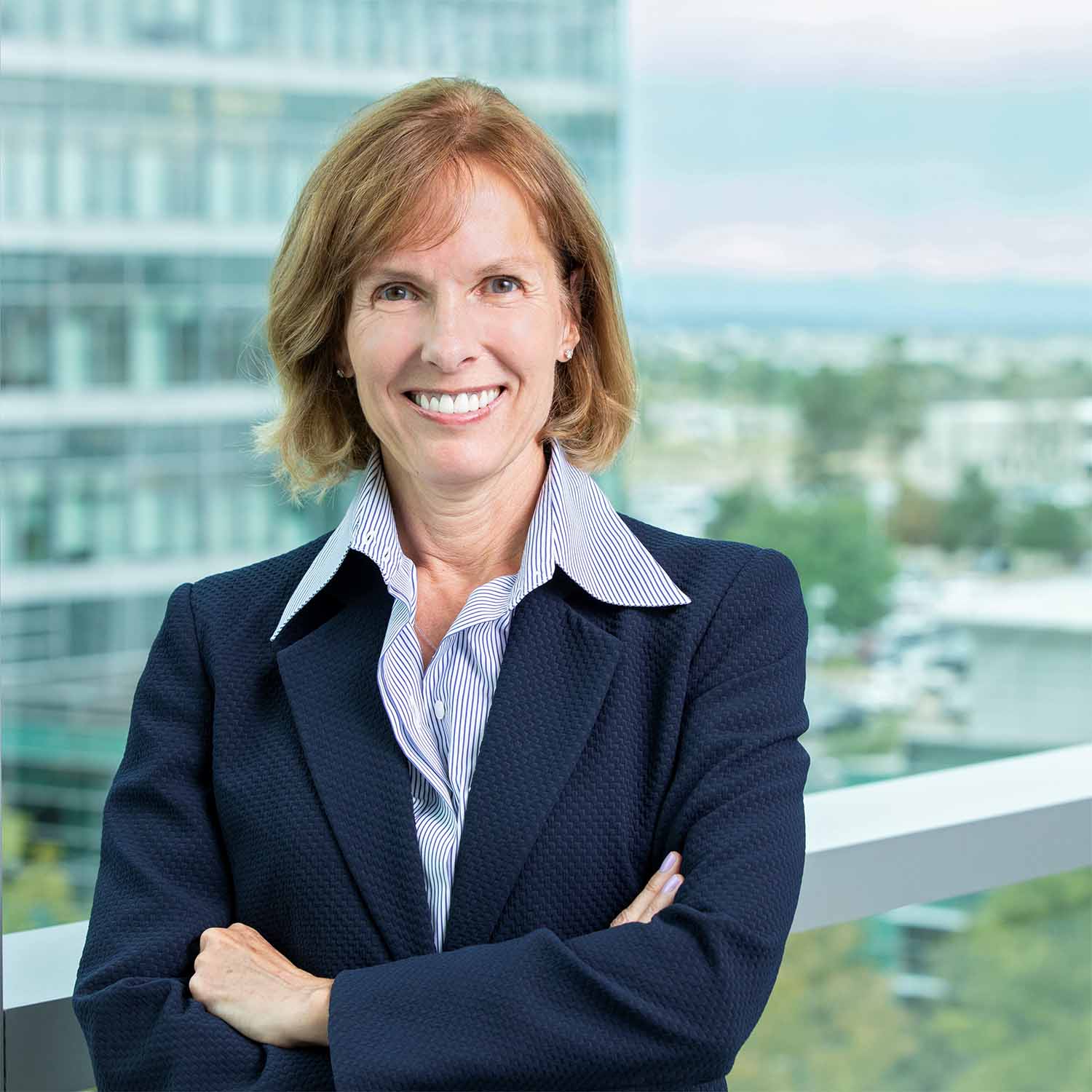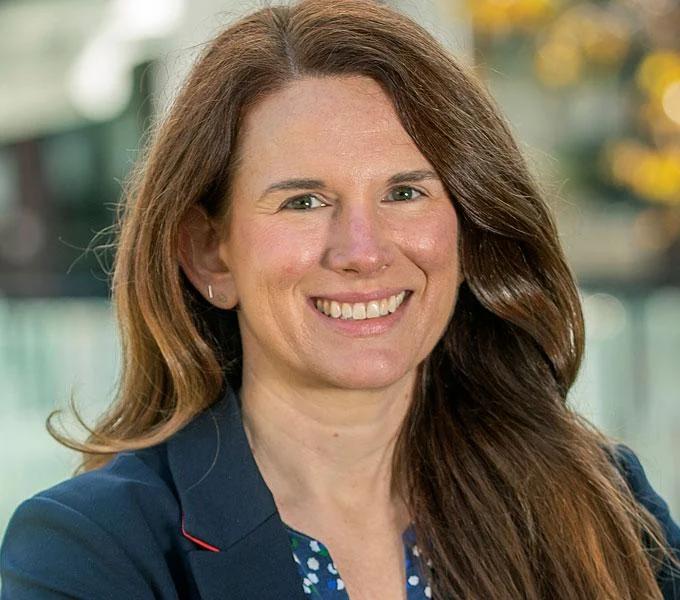Learning to “Aim High” Within Male-Dominated Fields in Public Health
Cathy Bradley, PhD, and Lindsay M. Sabik, PhD, spoke about moving the needle forward in the public health space through research and persistence.
Cathy Bradley, PhD, is the dean of the Colorado School of Public Health, professor, and Deputy Director of the Colorado University Cancer Center.

Lindsay M. Sabik, PhD, is an associate professor, and Vice Chair for Research in Health Policy Management at the University of Pittsburgh School of Public Health and a member of the University of Pittsburgh Hillman Cancer Center

Within public health, the field of health economics is one that has historically been male-dominated. Forging a path to find your voice and learning to stand out as a woman can be difficult.
During a Breaking Barriers: Women in Oncology discussion, Cathy Bradley, PhD, and Lindsay M. Sabik, PhD, both spoke about why they chose to work in this field and how they both have had to overcame challenges hold the positions they have today.
Bradley is the dean of the Colorado School of Public Health, professor, and Deputy Director of the Colorado University Cancer Center. She spoke about defining moments in her career, beginning a family while holding her first academic position, and why she believes work/life balance doesn’t exist.
Sabik is an associate professor, and Vice Chair for Research in Health Policy Management at the University of Pittsburgh School of Public Health and a member of the University of Pittsburgh Hillman Cancer Center. She discussed her research on disparities in the health care system, learning to navigate the field as a woman and mother, and advice she would give to a woman just beginning to work in her field.
Sabik worked closely with Bradley at the beginning of her career, and that model of mentorship helped her develop and create a network of like-minded individuals to draw expertise from and lend guidance where needed.
“Don’t give up. [Give yourself grace when] holding yourself to such a high standard,” said Bradley.
Discovering an Interest in Public Health
Bradley found her passion for public health when she began research that would impact entire populations rather than addressing a single patient. Her efforts have focused on why patients with cancer remain employed to keep their health insurance and the consequences these decisions have on families and caregivers.
“[Patients] make these trade-offs about continuing to work or not, and seeing that some will forego chemotherapy and treatment to not jeopardize their jobs and the role that health insurance plays in those decisions [are big research foci of mine],” said Bradley.
Her research is also focused on Medicaid and using data to explore what may lead to health disparities. Through this work, she hopes to create informed policy changes to expand health insurance to as many patients as possible in a positive way.
Sabik’s passion has stemmed from Bradley’s research and a desire to shine a light on how different patients may or may not be able to access health care. She also focuses on patients with cancer in underserved populations.
“Cancer is such a prevalent disease and touches almost everyone as a patient or caregiver. It’s complex and costly to treat, but it is also an area where there are a lot of exciting scientific advances. If people can’t access those [advances], they can’t realize the promise of those new treatments. Understanding how to make sure that people are able to access the care they need when they need it is what motivated me [to choose this career],” Sabik said.
When Sabik first began her career, the Affordable Care Act (ACA) had just been introduced. She looked at the differences in how the ACA and state reforms have impacted cancer care access. Together, she and Bradley also investigated insurance expansion with Medicaid and increased cancer screening, which have led to earlier diagnoses.
The Evolution of Public Health
When Bradley first began her career, she noted that many population-based questions simply weren’t asked. Specifically, analyses focused on the quality of life of patients or caregivers, but not on the policies necessary in cancer care.
Bradley highlighted that she and Sabik have worked on analyzing secondary datasets and merging cancer registries to answer questions on population-based data. For example, she merged the Michigan cancer registry with Medicare and Medicaid data to conduct an extensive analysis and help answer crucial questions.
For Sabik, while there is now almost an excess of data, she describes them as “siloed” because it may be difficult to access and utilize the precise data necessary to answer questions in the public health/oncology space.
“We have been fortunate to be able to do a lot of work that combines different population-based data sources, but these are often focused on a single state or a single large health care system. We think continued efforts to support initiatives that bring together things like all-payer claims data and linking those to a cancer registry—and doing this across multiple states or nationwide—will be essential for allowing us to generate robust evidence on care delivery,” Sabik said.
Distinguishing Themselves in the Field
Working in economics, Bradley noted that it was hard being a woman, as there are very few women colleagues compared with men. She spoke about implicit biases that can be prevalent in the field. According to Bradley, economists are known as the toughest reviewers for papers, and being a woman adds to these obstacles.
Sabik spoke about struggles she had between her personal and professional life. On top of the challenging nature of the academic field, being a young parent or having a family can create a difficult work atmosphere.
“There are challenges that are even more pronounced in some fields but are universally challenging for women trying to navigate academic and personal milestones at the same time,” said Sabik.
Bradley’s son was born the same year she had accepted her first academic position. She noted that it was hard to take care of children, deal with pregnancy, and juggle work. She was also caring for her aging parents during this time as well.
Due to the COVID-19 pandemic, she feels these conversations about balancing these responsibilities are becoming more commonplace. Even today, however, there is a large proportion of work still handled by women.
Sabik echoed Bradley’s point, describing the societal burden placed on women to handle both personal and professional lives. She highlighted the challenges of always needing to prioritize and learn how to accomplish tasks without getting overwhelmed.
As both women are in leadership roles, they highlighted a stigma they have noticed in which men who make certain decisions are considered strong leaders who don’t bend to peer pressure, while women who make the same call would be viewed in the opposite light. As a newly appointed dean, Bradley noted she has felt some bias on her gender.
However, she hopes that this will change these biases can change over time. Sabik agreed and found it refreshing to see more women being appointed to leadership roles over time.
Defining Work/Life Balance
Bradley believes that work/life balance does not exist.
“Maybe I’m just not doing it right,” she noted with some humor.
As an academic the work never ends; it often comes home with her. During the conversation, she pointed out that her 2 adult children had both texted her during the discussion, which furthered her point that work and life will bleed into each other.
Sabik agreed and said there is no solution for issues like this. She has relied on Bradley and other mentors to learn to prioritize between work and her personal life.
“You can’t do everything professionally, and you can’t do everything as a parent or a partner. Trying to figure out what’s important at that stage and focusing on those things, and getting used to letting things go or declining others are just necessary to stay sane and to be able to [accomplish] the things that matter,” she said.
Both researchers are open to learning about other strategies that may help with prioritizing or finding the “perfect” balance.
Mentors Who Helped Set the Stage
Bradley was Sabik’s mentor when she was first entering the public health space, and while the dynamic was mentor/mentee, Bradley now receives mentorship from Sabik at times and takes notes on how the latter conducts her research team, Bradley describes it as “remarkable”.
When Bradley first began her career, she had 2 professors take an interest in her which allowed her to learn and develop a career in the niche intersection of public health and oncology. Prior to this conversation, she had received an email from one of the professors at her undergraduate university congratulating her on her new position as dean.
Sabik highlighted her relationship with Bradley as important. She has had various mentors in different areas who helped teach her skills in framing important research questions, communicating results, and writing papers and grants.
“Mentorship is important at every stage. It’s not just for when you’re junior or starting out. It can be so fulfilling to serve as a mentor to students and more junior researchers and learn a lot from them in addition to helping them navigate the process,” said Sabik.
The pair dived into how they felt that their relationship has helped impact their careers. Bradley noted that Sabik was the best recruit she ever had. Even now as they no longer work for the same institution, they are still able to collaborate.
“It’s been rewarding for me, not only in terms of being part of her career but also continuing for us to be part of each other's career,” Bradley said.
For Sabik, her relationship with Bradley was essential for kickstarting her career, but it has now evolved past that stage. She has been able to connect Bradley with some of her mentees to create a network where others in the same field can share ideas or experiences.
For those who are just starting out in the field, it can be helpful to receive advice from those who are more established. Bradley’s big pieces of advice included the need to network, find a mentoring style that works for you, and advocate for yourself.
“Women still don’t advocate for themselves as much as much as men advocate for themselves. Being able to say, ‘Could you nominate me for this?’ or not being shy about asking for a letter [of recommendation] or somebody to send an email on your behalf. That’s important, and we don’t do enough of that. Raise your hand, say ‘I want to be I want to be part of this’,” said Bradley.
Sabik suggested not to let setbacks be discouraging. In the field of academia, there is a lot of rejection. She highlighted that we should all hold ourselves to high standards but know that persistence is needed.
Bradley’s parting words for any woman entering the field emphasized aiming high.
“Aim for a good journal, aim for an R01, aim for these kinds of things. You can always adjust, but start out aiming high,” she said.
How Supportive Care Methods Can Improve Oncology Outcomes
Experts discussed supportive care and why it should be integrated into standard oncology care.